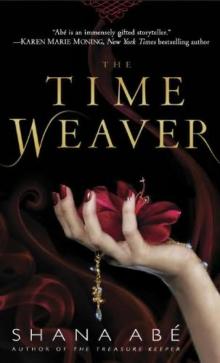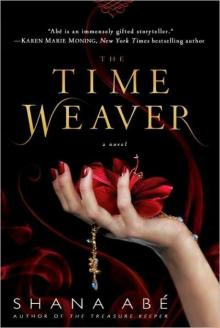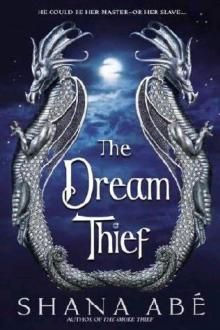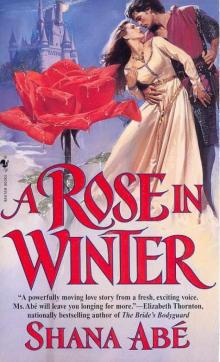The Dream Thief Read online
Page 10
“Does it please you, beloved?” he asked, smiling, and she knew all he really meant was, Is it worth it?
She wondered how much gold, exactly, he had brought with him in his valise; she herself had lost her bank vouchers with her trunks. But she returned the pale shard to the bowl, resisting the urge to rub her wrist upon her skirts. Instead, she picked out a different stone.
“This one pleases me.”
It was a chunk of dull yellow, chipped and glassy. Even the seamstress lifted a brow.
“Madame does not want the diamond?”
“No, I think not. We’ll take this.”
It was presented to her wrapped in tissue, along with a series of boxes for the gowns and undergarments, the seamstress clucking under her breath all the while. Zane carried the lot of it back to their carriage. He waited until they were both inside before flicking open the tissue to examine the yellow stone.
“What was amiss with the diamond? I could have bargained her down to a song.”
“Well good it would have done you. The thing was paste.”
“Ah.” His lips curved. He tipped the stone to his palm. “And what, if I may ask, is this?”
“It is a sapphire,” Lia said. She took it from him and blew on it, then held it up to the window, to the flare of the sun that spilled through the glass. She glanced back at Zane.
“Yes?”
“Never mind.”
With the light streaming into it, the chunk of sapphire took on the exact wolf tint of his eyes.
The carriage bumped and rolled. They plunged into shadow again.
“Lia,” he said, abrupt. “What will happen to you when we get back to Darkfrith? What will the council do to you for running away?”
“Nothing,” she lied. “Or perhaps a very small something. Confinement for a month. Blindfolds, bread and water-I’m jesting. I’m the daughter of the Alpha. Once I explain why I did it, everyone will understand.”
His brows lowered into a frown, his gaze brooding. She couldn’t tell if he believed her or not.
“Thank you,” she said, to distract him. “Thank you for-well, for everything.”
It worked. He shrugged and turned to look out the window, following the buildings they passed. Lia curled her fingers around the sapphire, content to watch his face in the dark and shifting light.
CHAPTER EIGHT
Once there was a princess.
She was very fair indeed, no doubt the fairest princess of any princess who had ever been or ever would be. For she was not merely a princess but an actual dragon in disguise, and that meant she was beyond beauty: she had eyes that glowed and skin like a moonlit rainbow. When she spoke, the rivers paused to listen, and when she moved, the ground yielded beneath her feet in reverence to her greater glory.
She heard the minerals that sang beneath the mountains, pockets of diamonds, heavy veins of gold. She could vanish into wisps and bound across the sky with wings and scales and frightening beauty, because in her delicacy she represented the very finest of her kind.
It is well known that the drákon are the most lovely of all creatures. Their bodies are sinuous and slick; their eyes blaze and their claws are crystal daggers. They glint green and blue and red and gold, all the colors of all the jewels. And since this medieval princess was considered the best of even these beings-her walk, her face, the grace of her hips and legs and her slender, clever fingers-she was prized above all things.
Dragon-men from the four corners of the sky came to woo her. Human men laid flowers where she walked, and spoke of the music of her voice, or the color of her hair, or how her eyes would pierce their souls with a single, indifferent glance, draining their hopes and dreams.
It was not her fault she was like this. It was only who she was born to be: the precise, absolute pinnacle of her kind. She was a treasure, guarded in a mighty castle perched high in the Carpathian peaks, betrothed to a dragon-prince. Her life was a glimmer of gemstones and alchemy. Her future was writ in stone. She would marry and breed and bear superb children, and the drákon would reign for a thousand, thousand years above the earth.
If only that peasant boy hadn’t shown up. If only he hadn’t dared to seize what was not his own.
So:
Once there was a princess.
And once there was a lowly serf.
Their futures were about to clash. Destiny would shudder. Silver stars would fall. But nothing was going to stop that boy from stealing what he desired.
He was a real bastard, if you think about it.
CHAPTER NINE
For the next three days, the weather held. Zane was glad of it-far more than glad. The sky burned blue and the wind blew mild, so he was able to remain outside the carriage. Away from Lia.
If the Roma thought it odd that his English passenger did not wish to travel in secluded luxury beside his wife, he kept his own counsel. For three days Zane sat with the coachman, letting the sun sink into his bones, watching sunflower fields and meadows and darksome forests clip by.
And for three nights, they’d found refuge in inns, happily off-season inns. Every one of them had two rooms to spare.
The meadows slowly folded up into hills. Every evening he would sit with Lia and discuss the next day’s route; he could hardly ask her much else, not in the cramped, public rooms they found. She was usually quiet, which he supposed was natural to her. Of all Rue’s children, he remembered that Amalia was the still one, always lingering alone behind her siblings when he saw her…laughing with them when roused, teasing with them when prodded, but somehow distant. Apart.
Brown-eyed, golden-haired; a skinny little daisy amid all the pretty gardens of dragon-children. Aye, he remembered her reticence.
But it left him to fill in the conversation, something Zane had never learned to enjoy. Before Rue had stepped into his life and steeled his manners into something approaching civilized, he’d used conversation the same way he’d used his picks-for skill, for information, and that was it. Social chatter was for nobs who didn’t have to work. And Zane, one way or another, was always working.
So suppers in the countryside became the two of them dining in silence, with peasants in homespun offering stews and fried pork and steaming boiled cabbage, and Zane covertly following the play of firelight over Lia’s face. Or the way her lips moved. Or how her coiffure never seemed completely tamed, but somehow always perfect, with wayward strands that curled against her neck and shoulders just like from a portrait painting, no matter how tightly she pinned the rest.
Country inns were drafty places. Someone would open a door, someone would unhinge a window, and the strands would lift and he’d find himself adrift in her scent, in cool winter roses, a fragrance subtle enough to raise the hairs on the back of his arms and sweet enough to drown out the stink of the cabbage.
She no longer wore hair powder. She hadn’t even bought any back in Jászberény with the rest of her toiletries; he almost wished he didn’t know why.
But he did.
In a way the past three days had been a comfortable dream, because even though the sun shone warm and the pastures were picturesque, and no one followed them-another reason to ride above-deep in his gut Zane knew it couldn’t last. Dame Fortune was never so accommodating as that.
He was a mongrel masquerading as a gentleman. Lia was a myth masquerading as a lady. Impossible as it seemed, he’d bet his arse someone knew where-or what-one or both of them truly were. And what they were doing here.
As they set out that fourth morning, winding deeper and deeper into the rising green hills that led into Transylvania, with the clouds behind them spreading thin and sparkling, Zane couldn’t shake the feeling that this day-this cold, crystalline day-was going to be the end of their fair streak of luck.
Damned if he wasn’t right.
She was sick of riding inside the carriage. She was sick of the carriage itself. She was sick of the constant swaying, and of the horses curling their lips in fear when they saw her, and of th
e coachman smirking at her, and of Zane avoiding her eyes all the time, and of the bloody, bloody diamond singing to her across the heavens in a symphony that was not getting any softer the nearer they got.
Lia pressed her fingers to her temples and sighed. She wasn’t sleeping again. Like the call of Draumr, the dreams were getting stronger. Sounds. Scents. His lips, his hands, stroking her body every night, kisses and whispers and she’d wake in a panic, thinking it was real. That it was already real.
But she still slept alone. How much longer, she couldn’t say. The future was looming, and she had yet to figure a way to avoid it.
She was going to be his lover. It might as well have been scrawled across the stars. In all the dreams, in all their outcomes, that part was always the same. And once that happened, Amalia knew the final threads of her safe, guarded existence would forever unravel.
The drákon mated for life. She could not sleep with him and then just slip away; she could not use her own body so lightly. Perhaps it was that there were so few of them left, but mating-marriage-was taken with great gravity back in the shire. The young children played games mocking love; as they grew older the games turned more sensual, and more serious. By the time marriage vows were exchanged in Darkfrith’s lone and white-marbled chapel, all games were done. Husband and wife were sacred to her kind. No one divided them. No one even tried. To do so would be to risk the punishment of the tribe: imprisonment. Even death.
She was born to a world of harsh, shining rules. When she gave her body to Zane, she would be giving him her heart. And so her life.
He would never wed her. She knew from her dreams that wasn’t what he desired; his hopes and ambitions ran far darker than that.
He craved power and luxury. He craved possession, not love. In the blind future she would bring him riches and pleasures he’d not yet imagined. She would steal and lie and twist fates for him. And for a mortal man who could not truly open his heart, it would be enough.
For a creature who had long ago lost hers to him, it would be an abomination.
She was trapped. She was stuck between worlds, too much a beast to become fully his, too much his to become fully drákon.
In Darkfrith she’d avoided the places she knew her peers went for stolen moments. She’d removed herself as far as possible from the hidden pockets of woods, and the old granary, the swimming stream, and the secret cave by Blackstone Fell that wasn’t secret at all-not to young couples. Even her brothers and sisters thought her painfully chaste.
She wasn’t. God knew she wasn’t.
Lia sighed again and leaned forward to drop her head in her hands. Nineteen years old, a virgin who’d never even known an actual kiss-yet she knew all about making love. She knew a human man’s taste, and his body heavy over hers, and the wild pleasure of him inside her, every night. She did whatever he asked of her, everything he asked. She did things she’d never known a man and woman could do together.
Touch me here. Like this.
Take me in your mouth.
Lie back.
Put your arms above your head.
Do you feel this, Lia? Tell me. Tell me how I make you feel.
Tell me what you want me to do to you.
No wonder she couldn’t sleep.
And she was so tired, and so cold…
She was cold. She sat up to push back the curtains of the window and saw that the clouds of this morning had caught up with a vengeance; the sky had bruised into heavy purple, swallowing the sun. They were winding through what appeared to be rows and rows of gaunt, woody grapevines, starkly beautiful, almost endless. At the blur of the horizon were blue-veined mountains with their peaks veiled in storm.
She drew the sheepskin around her knees a little higher. It was going to snow.
Even as she thought it, the first of the flakes tapped the window, holding its shape just a heartbeat before sliding away. The next three did the same, and the fourth stuck. In less than a minute the window was edged with white.
She kept her hands tucked under the folds of her new worsted cloak and watched the grapevines gradually vanish under powder. In all the distance there was nothing that indicated a town or a village, not even a farmhouse for all those grapes. The light was dwindling and the carriage bumped on.
The sound of hooves against packed dirt was a steady, even staccato…it was a rhythm she knew now down to her bones, in her sleep, thump-thump, thump-thump, like a lullaby…when she closed her eyes she could see it too, gray hooves, brown dirt…the outline of horseshoes and mud printing through the clean new snow…
And the grapevines were sleeping through the cold, and the wild geese had their heads bent under their wings, and the mice in the great house were silent against the baseboards, listening to the wind, eyes open, whiskers twitching…
She knew that house. She knew, suddenly, where they were.
Lia came awake just as the driver’s slot above her snapped open, sending a wash of cold air over her face. Zane’s fingers entwined with the metal grille.
“Amalia. There’s what looks like an empty mill up ahead. We’re going to have to take shelter there.”
“No.” She climbed over the seat to kneel just below him. “Keep on this road. There’s a villa farther along. They’ll take us in.”
His fingers vanished; he bent down to see her face.
“A villa?”
“Yes. It’s not far.”
His tricorne tilted low over his eyes. Snow dusted his collar and shoulders.
“Are you certain?”
“Yes.”
“Forgive me. Might I inquire how you are certain?”
“I-” she began…but it wasn’t a dream, not really; it felt more like a spell. Like what happened in the dreams, when she saw things that should be impossible to see.
“It’s ruddy cold up here, my lady. I don’t fancy us being mired in a blizzard.”
“Zane,” she said, leaning up to him. “It will be there. Just another minute.”
He observed her a moment longer from under the brim of his hat. She heard the coachman make an inquiring noise. The horses began to slow.
“No,” he said, turning back to the driver. “We’re going on.”
She kept the curtains open, so that when they rounded the next curving turn she could see the lights shining through the snowfall and just make out the fuzzy, leaden shape of buildings, low-slung against the grapevine hills.
“The Grand Tour! Most romantic! My dear.” István Hunyadi turned to his wife at his side. “Do you remember our journey to Vienna, all those years past? The boulevards! The food!”
“The dancing,” said that lady, with a tip of her silver-wigged head.
“Yes, yes. You were graceful as a dove.”
Hunyadi was a humble winemaker, or so he claimed. Zane doubted very much that was all the man did. Lia had been correct: this lonesome, twinkling place in the hills was nothing less than a villa.
They had been greeted at the gate by heavyset men bundled in scarves. The men spoke no French at all, so the gypsy had been the one to explain their situation, his voice rising when the gatekeepers had not seemed inclined to grant passage. The snow was falling thick and fast by then, and Zane was already calculating how long it would take them to slog back to that derelict mill, when one of the men held up a hand and barked an order to let them through.
The man had been looking at the carriage door, at the window. Zane had no doubt that Amalia was there looking back at him.
If his fingers hadn’t been numb and his nose a block of ice, Zane would have had them turn about anyway. But the gypsy clucked at the horses, and they eased inside.
At the entrance to the main house, more men rushed to greet them-footmen, Zane had supposed-but once he’d gotten a better look at them, he realized they weren’t. They wore no livery, done up instead in furs and plain wools in earthen colors, their hair shaggy and unkempt down their backs. He’d taken Lia’s arm and kept her close as they ducked through the snow in
to the atrium, a wide, stone-lined mouth that seemed to swallow them whole with the closing of the doors.
The villa was made up mostly of limestone. The rugs beneath their feet were Persian. The paintings on the walls were oils. There was a series of pressed-glass lamps swaying gently from the ceiling; they were colored violet and burgundy and gave off a pirate’s glow.
Zane put his lips to Lia’s ear. “Do you know who lives here?”
She shook her head. But by then it was more than apparent who lived there, for he was coming down the hallway toward them, a short, wide man wreathed in smiles.
“God’s grace, to be out with your lady in such a storm! Come in, come in! You are welcome here!”
Hunyadi was dressed in velvet, and he spoke fluent French. He bowed like a courtier and laughed like a bawd. Zane was inclined to like him, if for no other reason than the man wore an immense gold chain around his neck studded with rubies the size of quails’ eggs.
That, and he didn’t serve cabbage at his table.
They had interrupted a pastoral partie de plaisir, it seemed. There were a dozen other guests present, every one of them done up in wigs and jewels, and painted faces with lips that curved politely at Lia and Zane’s damp, bedraggled state. But as their host had welcomed them, the guests could do no less. Two extra places were set at the table, soup served, wine poured. Zane sat back in the soft candlelight and began his careful ravel of lies and truth of how they had come to the kind Monsieur Hunyadi’s door.
Lia seemed to hear none of it. She sat clutching her wineglass, gazing off into the shadows. She wore the best gown the couturière had to offer, a rich, deep green affair with black lace and ribbons that paled her skin to alabaster. Even with her cheeks scrubbed and her hair pulled back, she outshone every other woman in the room. They knew it too, these blue-blooded Hungarians. Under thinly arched brows the women exchanged whispers and glances and lifted their noses as they eyed her up and down.

 The Second Mrs. Astor
The Second Mrs. Astor The Treasure Keeper
The Treasure Keeper The Deepest Night
The Deepest Night The Treasure Keeper d-4
The Treasure Keeper d-4 The Time Weaver d-5
The Time Weaver d-5 The Time Weaver
The Time Weaver The Smoke Thief
The Smoke Thief The Sweetest Dark
The Sweetest Dark The Dream Thief
The Dream Thief The Deepest Night tsd-2
The Deepest Night tsd-2 A Rose in Winter
A Rose in Winter Queen of Dragons d-3
Queen of Dragons d-3 The Smoke Thief d-1
The Smoke Thief d-1